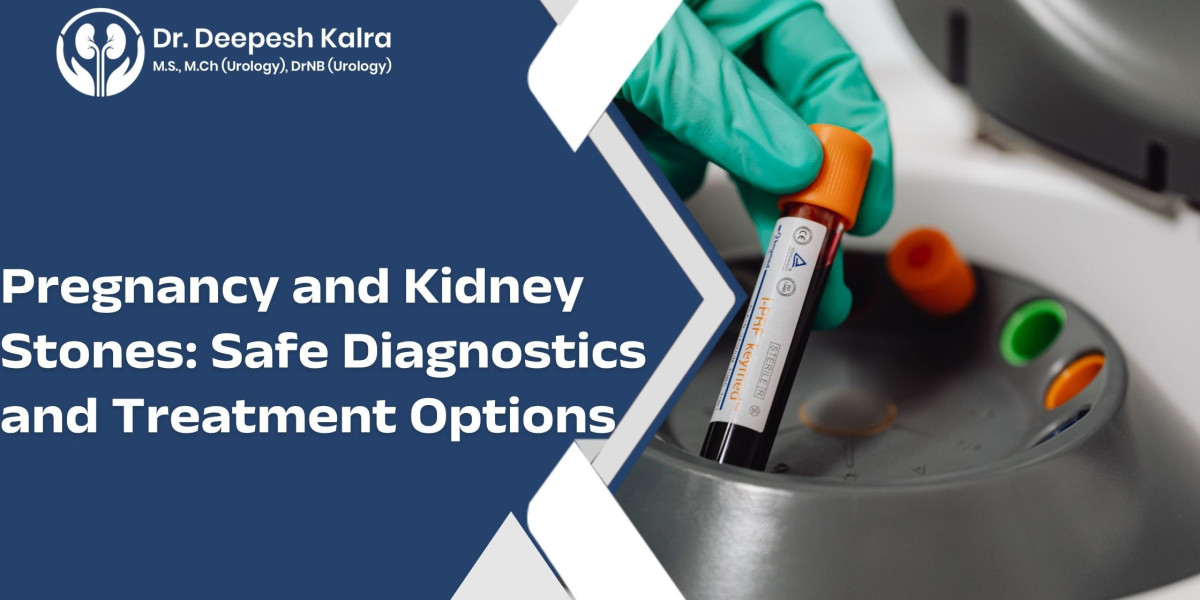Pregnancy is a transformative journey, but it often comes with unexpected health challenges. One such challenge—kidney stones—can be particularly distressing due to overlapping symptoms like abdominal pain, nausea, and urinary discomfort. Although the condition differs greatly from Urinary Bladder Cancer Treatment in Jaipur, both highlight the importance of specialized urological care for women’s health. For expecting mothers, understanding how kidney stones are diagnosed and treated safely during pregnancy is essential for ensuring maternal and fetal well-being.
Understanding Kidney Stones During Pregnancy
Kidney stones are hard deposits formed from minerals and salts in the urinary tract. While their overall incidence during pregnancy is relatively low, hormonal changes and altered urinary flow can increase the risk. Stones composed of calcium are most common, especially during the second and third trimesters.
Why Kidney Stones Occur in Pregnancy
Several physiological changes contribute to stone formation, including:
Increased Progesterone Levels: This causes relaxation of smooth muscles, slowing urine flow.
Hydronephrosis of Pregnancy: Mild dilation of the renal pelvis is common and can mask early symptoms.
Dietary and Metabolic Changes: Changes in calcium metabolism may also play a role.
Women with a personal or family history of kidney stones are at higher risk. Dehydration due to morning sickness is another contributing factor.
Key Symptoms to Watch For
During pregnancy, symptoms of kidney stones may overlap with normal physiological discomforts. However, certain signs deserve immediate attention:
Sharp pain in the back, side, or abdominal area
Blood in urine
Frequent urge to urinate
Painful urination
Nausea or vomiting
Because these symptoms may mimic urinary infections or other pregnancy-related conditions, accurate diagnosis becomes crucial.
Safe Diagnostic Tools for Pregnant Women
Diagnostic imaging during pregnancy must be selected carefully to avoid exposing the fetus to unnecessary radiation.
1. Ultrasound: The First-Line Diagnostic Tool
Ultrasound is the safest and most commonly used imaging technique. It helps detect obstruction, hydronephrosis, and occasionally the stone itself. While its sensitivity may be limited for small stones, it remains the preferred initial choice.
2. MRI (Magnetic Resonance Imaging)
When ultrasound results are inconclusive, MRI can be used safely. MRI urography provides detailed images of the urinary tract without ionizing radiation.
3. Limited CT Scans (Used Only When Essential)
Though avoided in most cases, low-dose CT scans may be considered as a last resort when other methods fail. The decision is made carefully, weighing maternal benefits against potential fetal risks.
Safe Treatment Options During Pregnancy
Treatment depends on stone size, location, severity of symptoms, and gestational age. Most stones can be managed conservatively, but some cases require intervention.
1. Conservative Management
For small stones, doctors typically recommend:
Increased fluid intake
Pain management with pregnancy-safe medications
Monitoring stone movement
Hydration is particularly important, though excessive fluid intake should be avoided if it worsens symptoms.
2. Medications (Used With Caution)
Certain pain relievers and antiemetics may be prescribed, but NSAIDs are generally avoided during pregnancy. Alpha-blockers sometimes used for stone passage in non-pregnant individuals are rarely recommended for pregnant women due to limited safety data.
3. Minimally Invasive Procedures
When pain becomes intolerable or there is an infection or persistent blockage, urologists may opt for minimally invasive interventions:
Ureteral Stenting
A stent helps bypass obstruction and restore urine flow. Though not a permanent solution, it relieves symptoms effectively.
Percutaneous Nephrostomy
In cases of severe obstruction, a small tube is inserted directly into the kidney to drain urine. This is considered safe and effective.
Ureteroscopy (URS)
URS is increasingly used during pregnancy and is considered safe during the second trimester. It allows the urologist to visualize and remove stones without major incisions.
Procedures like shock wave lithotripsy (SWL) and percutaneous nephrolithotomy (PCNL) are not recommended during pregnancy.
Prevention Tips for Expecting Mothers
Preventing kidney stones should be a priority for pregnant women, especially those with a history of stone formation. Key prevention measures include:
Staying adequately hydrated
Reducing sodium intake
Maintaining a balanced diet with moderate calcium
Monitoring vitamin D and calcium supplements with your doctor
Regular check-ups with a urologist are beneficial, especially if warning symptoms appear during the pregnancy.
The Role of a Specialized Urologist
Kidney stone management during pregnancy requires expertise, caution, and multidisciplinary coordination between obstetricians and urologists. A specialist with experience in handling complex urological issues—including areas like Urinary Bladder Cancer Treatment in Jaipur—is better equipped to manage delicate cases involving pregnant women, ensuring both safety and optimal health outcomes.
Conclusion
Kidney stones can be particularly challenging during pregnancy, but with the right diagnostic tools and carefully chosen treatment options, they can be managed safely and effectively. Early detection, proper hydration, and timely consultation with an experienced expert are key to protecting both mother and baby. If you experience persistent or severe urinary symptoms during pregnancy, seeking guidance from the Top Urologist in Jaipur can provide clarity and confidence throughout your treatment journey.






